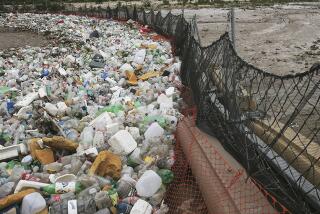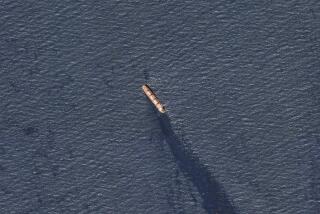Oil Still Leaking Into Gulf From Kuwait : Pollution: Environmentalists assail the slow pace of cleanup. But Saudis claim significant progress in fighting the spill.
- Share via
DHAHRAN, Saudi Arabia — A broken pipeline and ruptured storage tanks in Kuwait are feeding 126,000 gallons of new crude oil a day into the enormous spill that is ruining the coastal waters of Saudi Arabia and other Persian Gulf states, Saudi officials report.
The spill, a byproduct of the war with Iraq, continues to daunt cleanup crews 11 weeks after an estimated 2 million barrels of oil were dumped into the Gulf.
Coupled with hundreds of oil well fires raging in Kuwait, the spill constitutes a war-spawned environmental disaster that could threaten the Gulf’s complex ecosystem for years and has already killed wildlife and ravaged Saudi Arabia’s shrimp industry.
After a barrage of criticism from environmentalists and others who charged that the cleanup was moving at a dangerously slow pace, Saudi officials this week released figures intended to illustrate significant progress in efforts to remove oil from Gulf waters.
More than 800,000 barrels of oil-saturated water have been skimmed and pumped from Saudi Arabia’s shoreline, said Jennifer Freedman, a spokeswoman for the Saudi Meteorology and Environmental Protection Administration.
The campaign was plagued from the start by the war, Saudi Arabia’s financial troubles and infighting among rival government agencies. There were delays in acquiring equipment and in dedicating manpower and know-how to stop the flow of oil--delays that environmentalists say let the oil seep into sensitive fishing grounds and bird-breeding areas.
Adding to the trouble, observation flights by the U.S. Coast Guard last week spotted oil flowing from damaged storage tanks at the Ahmadi terminal south of Kuwait city and from a broken pipeline at Abu Halayfa, farther north.
The Coast Guard reported that the two leaks were pouring an estimated 3,000 barrels--or 126,000 gallons--into the Gulf each day.
The oil is moving south toward Saudi Arabian waters, Freedman said.
The new leaks underscore one of the major obstacles in stopping the spill’s damage: cutting it off at the source. With much of Kuwait’s main harbor mined until recently and work to put out oil well fires going extremely slow, little has been done to stop the flow of oil.
On Sunday, an oceangoing Dutch tug towed from the Kuwait city harbor the first of several damaged tankers that may be sources of some spilled oil, Freedman said.
The spill had appeared to be slowing in mid-March as it lingered inside the Saudi peninsula of Dawhat ad Dafi.
But on March 18, the slick breached that barrier and continued southward. It now stretches about 275 miles from Kuwait, along Saudi Arabia and into the waters around Qatar and Bahrain.
The spill was triggered Jan. 23 when, according to U.S. officials, Iraqi President Saddam Hussein ordered the opening of spigots on a Kuwaiti offshore oil terminal.
Freedman said the last three weeks marked a “substantial upswing” in the amount of oil that workers were capturing and depositing in large collection pools.
Key to the increased cleanup pace was the ability of Aramco, the Saudi-owned petroleum conglomerate, to more than double the amount of oil it is retrieving. Aramco has been working with a task force of international groups, the Saudi agency and a variety of private contractors to protect the desert kingdom’s crucial desalination and hydroelectric plants and, now, to defoul the shoreline.
Another Dutch contractor working for the Saudis this week began flushing oil from the mangrove-covered island of Al Qurmah.
Despite the limited advances, critics maintain that efforts come too late to avoid devastating environmental damage. The Saudis acted quickly--and successfully--to protect their water supply and harbor facilities when the oil spill began, but they allowed crucial time to pass while the slick spread south into Saudi wetlands.
Oil sheen and “tar balls”--two of the early signs of an approaching oil slick--have been spotted as far south as Qatar and Bahrain.
More to Read
Sign up for Essential California
The most important California stories and recommendations in your inbox every morning.
You may occasionally receive promotional content from the Los Angeles Times.











